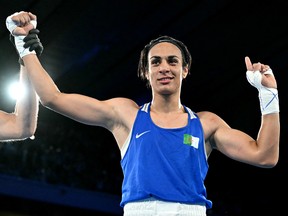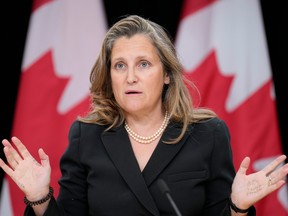The overhaul of gender divisions in sport was overshadowed by changes to school pronouns policies
Article content
OTTAWA — A Summer Olympics rocked by controversies over gender identity hasn’t deterred the Alberta government from moving ahead with planned changes to gender divisions in competitive sports, according to the ministry overseeing the new policy.
“Alberta is committed to safety and fairness in sport,” wrote Amber Edgerton, a press secretary for the Alberta ministry of tourism and sport, in an email to the National Post. “Which is why we’re working with provincial sporting organizations (PSOs) to ensure that biological women and girls have a choice to compete in a women’s only division in athletic competitions.”
Advertisement 2
Article content
Edgerton added that simultaneous efforts are underway to expand opportunities for transgender female athletes to “meaningfully participate” in their chosen sports, such as by opening co-ed divisions for athletic competitions.
Edgerton said that the ministry plans to introduce the new sports legislation in the fall. She declined to say whether an interim policy will be introduced for K-12 sports in time for the start of the school year, now just a few weeks away.
She also couldn’t say whether ongoing consultations have touched on how the new law could affect the eligibility of female athletes with differences in sexual development (DSD), such as elevated testosterone levels, to compete in the new women-only divisions — a topic that dominated the recently completed Paris Games.
The changes were announced in late January as part of a package of policies affecting trans adults and gender-questioning youth. In a video announcing the new policies, Premier Danielle Smith said that “obvious biological realities” give transgender female athletes a “massive competitive advantage” over women and girls.
Article content
Advertisement 3
Article content
“It is not beneficial for… women, including those who are transgender, for this divisive and sometimes dangerous situation to continue,” Smith added.
The overhaul of gender divisions in sport was overshadowed, at the time, by more topical changes to school pronouns policies and gender-affirming medical procedures for minors; but could face new scrutiny with the media firestorm surrounding women’s boxing gold medalist Imane Khelif sparking a renewed debate over gender diversity in sports. The Algerian welterweight is not known to have DSD but nevertheless became the face of the controversy after winning a preliminary bout against Italy’s Angela Carini in just 46 seconds.
Blaine Badiuk, a UCP member and grassroots party activist based in Lethbridge, Alta., says there’s no cut-and-dry way for governments to regulate the participation of DSD athletes in women’s sports, noting that Khelif would be permitted to compete as a woman under legislation recently proposed by the B.C. Conservative Party.
Recommended from Editorial
Advertisement 4
Article content
Badiuk, who is trans, said that she thinks the new Alberta policy is well-intentioned but too heavy-handed. Badiuk herself favours a more decentralized approach that would empower individual sporting organizations to set their own gender diversity policies.
“Have (the PSOs) do their own research and make their own conclusions,” Badiuk said by phone.
The furor over female athletes with DSD could also be a headache for the federal Conservatives. Party leader Pierre Poilievre said in February that “biological males” have no place in women’s and girls sports and Conservative delegates voted overwhelmingly in favour of a resolution to protect “women-only” sports categories at last year’s party convention.
When asked to clarify Poilievre’s statement in relation to female athletes with DSD, a source in the opposition leader’s office referred to a statement posted to X by Calgary Nose Hill MP Michelle Rempel Garner shortly after the controversial Khelif-Carini bout.
Framing the boxing controversy as a safety issue, Rempel Garner wrote, “(like) most Canadians, I don’t believe that anyone should be discriminated against based on their gender (but) I also believe that sport should be made safe for all.”
Advertisement 5
Article content
Rempel Garner said in the same post that she denounced the International Olympic Committee for ignoring the ruling of the International Boxing Association (IBA) last year that Khelif was ineligible to compete against women due to unfair biological advantages. IBA officials have since claimed that testing showed that Khelif has XY chromosomes, consistent with male DNA.
A number of national governing bodies, including Boxing Canada have left the IBA in recent years, citing both corruption and a growing pro-Russia bias. Last year, it became the first governing body to ever be ‘derecognized‘ by the IOC.
Rempel Garner didn’t respond to a request from the National Post to comment.
Badiuk says she’s worried that the uncertainty surrounding female athletes with DSD could lead to more ugly incidents like the one last year in Kelowna, B.C., where a man asked to see documentation proving that a nine-year-old competing in a girls track-and-field meet was born female.
National Post
rmohamed@postmedia.com
twitter.com/@rmohamed_yow
Get more deep-dive National Post political coverage and analysis in your inbox with the Political Hack newsletter, where Ottawa bureau chief Stuart Thomson and political analyst Tasha Kheiriddin get at what’s really going on behind the scenes on Parliament Hill every Wednesday and Friday, exclusively for subscribers. Sign up here.
Our website is the place for the latest breaking news, exclusive scoops, longreads and provocative commentary. Please bookmark nationalpost.com and sign up for our daily newsletter, Posted, here.
Article content








